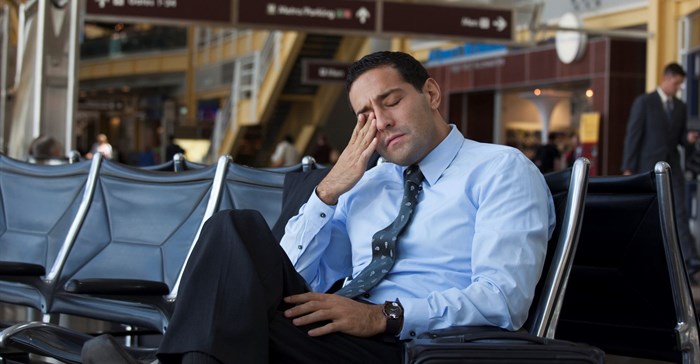
Top stories






More news


Marketing & Media
Ads are coming to AI. Does that really have to be such a bad thing?














Unfortunately, even though the government has opened the skies and the airports have opened their doors, airlines aren’t making it easy for passengers to fly. Just how much do they hate thee? Let me count the ways.
The first ticket I purchased was for British Airways. At that stage, when the lockdown first began, I figured I’d be flying home in less than a month. Obviously that didn’t happen given the lockdown extension, but I took comfort in the fact that the airline (like many others) had updated its cancellation and change policies. All I had to do was complete an online form and everything would be sorted. Or so I thought.
I received a confirmation email telling me I’d get my voucher within seven days. After more than a month of waiting, I contacted their call centre in London, which was so overwhelmed with enquiries that I only got through on a Sunday morning. I spoke to a customer service guy who sounded so exhausted and so defeated, perhaps because he was facing the prospect of the airline’s massive job cuts.
According to him, there was zero record of my booking. He suggested I speak to my travel agent – never mind that I didn’t use one. I tried to explain this, but he said there was nothing he could do. That was the end of our call.
I didn’t have time to fight for a refund, because I still had to make arrangements to get back home. So I booked a new flight with Kulula, which was quite affordable at the time. Unfortunately, when the government announced that domestic travel wouldn’t resume under the Level 4 lockdown for May, the flight was cancelled.
And yet I wasn’t too worried thanks to Kulula’s amazing customer service. For example, when my initial flight was cancelled, I was immediately booked onto another one, with no hassles or extra fees. I was even able to communicate directly with a friendly customer service agent, who once again changed my flight to a later date without any fuss. But then Comair went into business rescue and my ticket was cancelled again.
Despite somewhat empty assurances from Discovery that Vitality bookings are 'safe', I was reluctant to request yet another voucher since, like British Airways, it wouldn’t be valid until the airlines are flying again at the end of the year (assuming they fly again at all). So I filled out the Comair claim form, which was only sent to me three weeks after I enquired. Now I have to wait and see whether I’ll recover what I’ve spent.
After two failed tickets, I was hoping to get lucky on my third attempt. So I went with Mango, the last option that turned out to be the worst.
The airline initially had flights back to Cape Town scheduled from the beginning of June, with plenty of seats at the bargain price of R599. But I was hesitant to make a purchase right away in case, yet another "My fellow South Africans" speech – it’s our country’s new trigger for PTSD – changed the rules for the umpteenth time. Instead, I simply made a note to check the website every day, ready to pounce as soon as the price went up and/or the availability went down.
Eventually, when it became clear that the Level 3 restrictions would allow limited travel, I bought my ticket. And it’s clear that I did so just in time. I say this because Mango engaged in an extreme price increase by almost quadrupling the cost (to around R2,200) in the space of an hour. I was absolutely stunned (but also unbelievably relieved), which I imagine is the same feeling cryptocurrency traders experience when they get out of the market right before they get burned playing a dangerous game they don’t understand.
Unfortunately, that wasn’t the end of it. A week after I purchased my ticket, and with my flight so close I could feel it, I got an email informing me that it was cancelled (any company that sends you an automated "Dear Valued Guest" message clearly doesn’t value you enough if they can’t figure out how to address you by name). There was no explanation or apology – all I got was a voucher code.
Yes, I was impressed that this happened so quickly compared to British Airways, but I wasn’t impressed at all to realise that this wasn’t a voucher to rebook a ticket for another date. Instead of booking me onto the next available flight (like Kulula did without me even asking), Mango wants me to use the voucher as credit for a future purchase – that means I have to pay the difference (because I haven’t spent thousands on plane tickets already?!) if I want to travel as planned.
The experience got me wondering: did Mango deliberately book out more flights than it planned to operate, only to cancel them so that passengers would have to pay extra to get on new ones? I don’t know. But at this stage, I wouldn’t be surprised if that’s the case.
At the time of writing this, I still haven’t heard back about getting booked onto another flight. But I’m not holding my breath, given how slow Mango has been in the past (it’s been more than a year since the airline promised to compensate me for badly damaging my suitcase on a flight – the level of indifference, incompetence, and downright rudeness I’ve experienced from a dozen different customer service agents and baggage claim employees could make for an entire article on its own).
Meanwhile, Allianz Travel Insurance (who covered the Mango flight) is much like Chubb Travel Insurance (who dealt with the Comair claims) in being totally unhelpful. All I get are prompt, but somewhat generic responses that they won’t be paying out. Yes, there’s a clause in the contract that says they don’t cover pandemics, but there are some situations right now where claims might be valid and not automatically out of the question 'because, corona'.
In the meantime, I’m still stuck, seriously out of pocket, and facing the prospect of booking yet another flight to get home. Fortunately, there are options, including CEM Air (flying from 5 June), Airlink (flying from 8 June), and FlySafair (flying from 15 June), but all three are charging prices that are more than double what I paid on Mango.
Clearly, the rules that companies shouldn’t take advantage of the coronavirus through excessive prices don’t apply to airlines. Right now it seems like many are happy to charge a fortune (even with in-flight meals off the menu and oil prices at record lows), since the people allowed to travel are mostly those doing so for business purposes, in which case it’s the employer who pays.
But that’s not right. Indeed, as was clear from the chaos at the airport when I first came to Johannesburg, there must be plenty of passengers who are desperate to get back home, not just corporate executives who need a face-to-face meeting because they’re suffering from 'Zoom fatigue' (yes, it’s a real thing).
Then again, maybe the pricing is fair. Maybe it’s all about algorithms adjusting to shifting travel demand and other factors that I don’t pretend to understand. But airlines are still not treating passengers well.
Indeed, one of the things that you need to know about air travel and Covid-19 (in accordance with Section 69 of South Africa’s Consumer Protection Act) is that you’re legally entitled to a refund and just not a voucher for future travel – Section 133 of South Africa’s Companies Act forbids legal action while a company is in business rescue, which might be why Comair took its sweet time in responding to my query, happy to delay until it was 'protected'.
Travel editor Rory Boland sums it up well in a recent National Geographic guide to cancelled trips: "We know the industry is under an immense amount of pressure as a result of the pandemic, and do not want to see it suffer further. But it cannot be on consumers to prop up airlines and travel firms through this period as companies openly break the law and effectively use customer money as an interest-free loan, especially when so many people waiting for their money will be in difficult financial situations of their own."
How will this end? Nobody knows. My sincere hope is that airlines will survive.
It’s not just because I’ve written for all six of the local inflight magazines (seven, if you include South African Airways) and have even been on sponsored trips with many of the airlines in the past (for which I’m always grateful). It’s because a healthy industry with healthy competition (as opposed to one with just a few providers and fewer available seats) is a good thing. For example, Mango only reduced its prices when FlySafair offered lower fares.
Unfortunately, many airlines are doing themselves a massive disservice right now. I get that Covid-19 is a stressful situation for everyone and that it’s going to be devastating for the travel industry (especially if the government continues to insist that our borders will only open next year, never mind some of the countries that suffered far worse from the pandemic are already welcoming tourists) – but they need to think beyond just the short term.
Indeed, even though it might not feel like it when every day is some combination of a nightmare written by Franz Kafka and George Orwell, there will come a time when Covid-19 is behind us and more of us realise that it’s safe to fly again. At that point, there will be a moment of reckoning as people stop to remember who treated them well and who did not.
This applies to all industries and all relationships – friends, family, employees, employers, colleagues, neighbours, and brands. Those who were there for us when we needed them most are those who will get our love and support. But those who just wanted to exploit us financially or emotionally when we were at our most vulnerable are those who will be cut from our lives.
So let this be a warning to the companies that act like they can do whatever they want, never mind that the majority of passengers didn’t trust airlines even before the pandemic: enjoy your short-term pleasure but, like anyone who spent lockdown eating too much banana bread, get ready to suffer in the long-term pain. When passengers have better options in the future, you will be grounded for good.
• I was finally able to fly back home on Thursday 11 June. The process was smoother than I expected; perhaps a bit too smooth given that nobody at OR Tambo screened my temperature or checked my travel permit.
• Mango Airlines confirmed via email that they “endeavoured to resume flying initially on the 11th of June hence flights were made available for sale but only started flying on the 15th June due to operational reasons”. They’ve refused to honour the cash refund so I’m still sitting on a flight voucher that I have no idea when I’ll use. (Allianz Insurance agreed to refund the policy premium.)
• Comair (operator of Kulula and British Airways) sent an email to all creditors asking for an extension in publishing its business rescue plan. Anyone who wanted to lodge a dispute had less than four hours to do so, which means that people who don’t check their email all the time probably didn’t know about it until it was too late. (Chubb Insurance refused to refund the policy premium, saying it only does so when the policy is cancelled before the flight is due to take place.)
